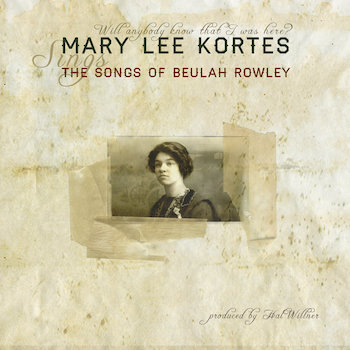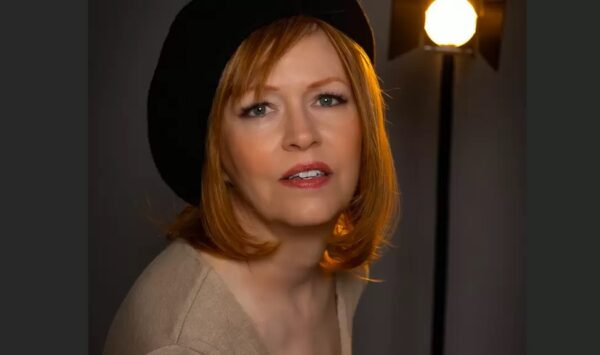Album Review: “Will Anybody Know That I Was Here? The Songs of Beulah Rowley” by Mary Lee Kortes
By Jason M. Rubin
The album suggests an earlier time, but most of the music is modern, relevant, and timeless.
 Astute readers will recall that on November 26, 2023, I reviewed the album Mr. Joe Jackson Presents: Max Champion in “What a Racket!”, a recording that purports to feature the long-lost music of a long-forgotten English Music Hall figure. The music indeed harkens to a previous era, yet the supposed composer, Max Champion, is, in fact, a fictional creation — a pseudo identity, complete with invented back story, that allowed Jackson to extend his genre-hopping history to its most radical level yet.
Astute readers will recall that on November 26, 2023, I reviewed the album Mr. Joe Jackson Presents: Max Champion in “What a Racket!”, a recording that purports to feature the long-lost music of a long-forgotten English Music Hall figure. The music indeed harkens to a previous era, yet the supposed composer, Max Champion, is, in fact, a fictional creation — a pseudo identity, complete with invented back story, that allowed Jackson to extend his genre-hopping history to its most radical level yet.
One astute reader of that review was Mary Lee Kortes, a New York singer-songwriter who has opened for Jackson and whose new album, Will Anybody Know That I Was Here? The Songs of Beulah Rowley, also purports to originate in an earlier time period. If one believes the liner notes, Ms. Rowley was a Depression-era singer and songwriter who perished in a house fire at the age of 21. Unbeknownst to many, her sheet music survived in a locked wrought-iron piano bencsh that just so happened to be purchased at a flea market by Kortes’ father when she was 10 years old. Her father opened the bench “and there I found them: Beulah’s songs and diaries all carefully preserved.”
If one reads further, however, one finds this telling sentence: “Just because I made this all up doesn’t mean it isn’t true.” You don’t get that kind of honesty from Mr. Joe Jackson.
What happened was that Kortes decided if I liked the Max Champion recording, I just might like Beulah Rowley as well. So she sent me the CD and the two-LP set, along with Beulah’s backstory and other fictional and factual details. She was right: I do like Beulah Rowley. In fact, I like it better. And the plain truth of the matter is that work on her album predated Jackson’s own time-travel recording, with the man himself contributing piano and background vocals on a couple of her songs.
“Joe did not in any way intentionally copy me,” Kortes insists. “In fact, we had dinner last summer and I told him that Max and Beulah should meet! Also, while his album carefully hews to that musical style, my album doesn’t try to sound like ’20s music.”
That is certainly true and is one reason why I like it better. Though it suggests an earlier time, most of the music is modern, relevant, and timeless. This is good old-fashioned singer/songwriter material, with understated but flawless instrumental backing from members of her band, Mary Lee’s Corvette (which includes long-time Ian Hunter guitarist Andy York), and a host of guest artists, such as the extraordinary horn player Lenny Pickett. And it’s all fronted by Kortes’s strong yet tender voice.
Asked why she felt the need to cloak her work in the identity of a made-up character, Kortes told me, “I was on tour in the UK and thinking about my next album. I hate repeating myself and so I didn’t want to do just another collection of songs. I went to sleep and woke up with this woman in my head: a Depression-era singer-songwriter named Beulah Rowley — both are names from my family. I wrote a song from her perspective, then I wrote her bio and more songs.
“I write fiction so I love to make things up,” she continued. “The interesting thing is that I tell the audience up front that she’s a fictional character but by the end of the show people ask me if I still have the original sheet music. They forgot it was fiction! Some people have gotten mad at me because they were invested in her. But there’s truth in her story and in her wanting to be heard. The emotional part of it is true.”

New York singer-songwriter Mary Lee Kortes. Photo: Charles Chessler
Beulah Rowley was produced by the legendary Hal Willner, whose credits are way too long to list. It was, in fact, the last single-act album he produced before dying from complications of Covid in 2020. Sadly, he didn’t live long enough to see the full recording released.
“The album is a kind of memoriam for Hal,” Kortes said. “It was wonderful working with him. His response to hearing my demos and reading Beulah’s story was, ‘I’ve never seen anything like this.’ When we tracked, he sat in the room with the band rather than in the control room. He had the lyric sheets in his hand, which helped him provide direction.”
As for the songs, some intentionally fit into the narrative of Beulah Rowley’s story, others are just damned good songs that could have found a place on any of Kortes’s albums. The 21 songs (including two bonus tracks) definitely have an arc to them, and it’s in the middle of the album that the drums get a little louder and the guitars get a little crunchier. Among the songs I’ve been particularly drawn to are “Green Sand,” “How Many Times,” “A Rain’s Gonna Come,” “Someplace We Can’t See,” “The Music Got Me Here,” and the title track.
Scattered throughout the album are three short parts of an original poem by Kortes called “Lost & Found.” In Part 3, on which Jackson plays piano, she ends with the line, “We only own what matters. What matters is our dreams.” I asked Kortes what that means to her.
“I wrote that poem after we started recording. Sometimes things occur to you and it’s not a calculated thing. I tried to get myself in a zone — in the Beulah zone, the beauty and tragedy of her life, its inspirational quality, the idea of having her music be discovered eventually. She was a dreamer and I’m a dreamer. I’m just trying to bring that optimism and positivity to my music.”
More information can be found at Mary Lee Kortes’ website.
Jason M. Rubin has been a professional writer for nearly 40 years, more than half of those as senior creative lead at Libretto Inc., a Boston-based strategic communications agency, where he has won awards for his copywriting. He has written for Arts Fuse since 2012. Jason’s first novel, The Grave & The Gay, based on a 17th-century English folk ballad, was published in September 2012. Ancient Tales Newly Told, released in March 2019, includes an updated version of his first novel along with a new work of historical fiction, King of Kings, about King Solomon and the Queen of Sheba. His latest book, Villainy Ever After (2022), is a collection of classic fairy tales told from the point of view of the villains. Jason is a member of the New England Indie Authors Collective and holds a BA in Journalism from the University of Massachusetts Amherst. jasonmrubin.com.
Tagged: Anybody Know That I Was Here? The Songs of Beulah Rowley, Hal Willner, Joe Jackson, Mary Lee Kortes, blues

Remember the Roxanne Shante’ songs in the 1980s? Those were answer songs.
He’s been doing them since his first album with “Is She Really Going Out With Him” from Leader of the Pack which he mentions in a 1979 interview so I don’t think he knows some people think he plagiarizes.
“An answer song, response song or answer record is a song (usually a recorded track) made in answer to a previous song, normally by another artist. The concept became widespread in blues and R&B recorded music in the 1930s to the 1950s.”
https://en.m.wikipedia.org › wiki
Answer song – Wikipedia